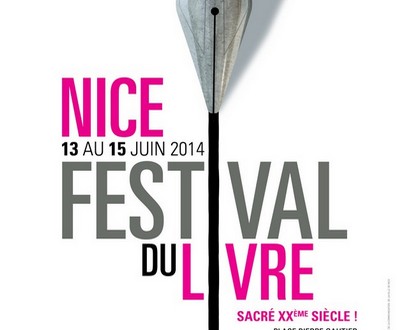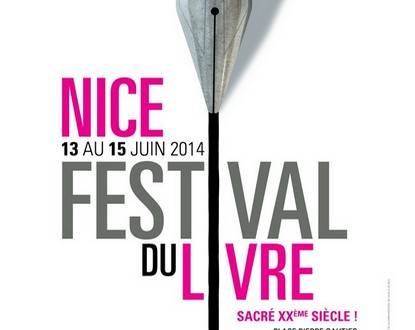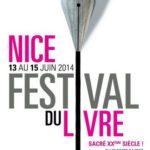From the seafront to the old town, the 2014 Nice Book Festival will bring together book lovers from June 13 to 15. Novelists, essayists, poets, polemicists—there will be more than 200 writers present in Nice this year under the presidency of the eminent sociologist and philosopher Edgar Morin.
 Autograph signings, debates, meetings, activities, and readings will punctuate these three days where particular focus will be on the sciences, society, history, and the arts of the 20th century.
Autograph signings, debates, meetings, activities, and readings will punctuate these three days where particular focus will be on the sciences, society, history, and the arts of the 20th century.
A multitude of debates and meetings
The authors invited to the festival will bring their perspectives, experiences, knowledge, and convictions to shed light on all the aspects of the 20th century that have shaped and built who we are today. Join them in debates and round-table discussions. Engage with them on the subjects of science, society, history, the arts, and literature of the “sacred 20th century.”
Sacred 20th century!
Great explorations, incredible scientific developments, the terrible clash of two world wars. Geography and people were profoundly changed throughout the century that preceded us. It is recounted by those who made it, those who lived it, those who expressed their ideas and beliefs within it. Researchers, politicians, warlords, or peace messengers. Poets too, novelists, and painters. From the trenches of 1914 to the fall of the Berlin Wall, from the adventure of the airmail to space conquest, rediscover the entire history of the men who made this “sacred 20th century”!
All the contemporary literary news
The writers and books people are talking about are at the 2014 Nice Book Festival. Douglas Kennedy, the author of “Temptation” and “Five Days,” signs “Whispering to Women” (Belfond); Jean-Noël Pancrazi, Marcel-Pagnol Prize winner for “The Mountain,” presents his very unsettling novel and account “Undetectable” (Gallimard); Pierre Assouline offers us “Sigmaringen,” the story of the last refuge in Germany of the Vichy collaborators in the final days of World War II (Gallimard); and Akli Tadjer, with his endearing tenderness, takes us into a melodrama with his secret “The Paradise Spa” (JC Lattès). Meet also philosopher Michel Onfray, paleontologist Henry de Lumley, former public prosecutor Philippe Bilger, gardener Alain Baraton, and novelists Sophie Bassignac, Didier Van Cauwelaert, Arnaud Delalande, Philippe Grimbert, Irène Frain, Sylvain Tesson… Plus a flurry of “celebrities” like Macha Méril and Michel Legrand, Nadine Trintignant, Brigitte Lahaie, Charlotte Valandrey, Véronique Genest, and many others…
Communication
No century has accumulated in its duration as many discoveries, as much technological advancement, particularly in communication. Does one even recall that in 1901 Marconi received the first “long-distance” telegraph signal from Cornwall to Newfoundland? That the first television broadcasts date back to 1930, and the transistor to 1947? Following the typewriter, the writer’s ultimate work tool, the first word processor was implemented in 1964 at IBM. Computing has generated incredible progress in information dissemination. From Roland Sicard to Jean-Jacques Bourdin or Philippe Bouvard, from Franz-Olivier Giesbert to Serge Moati, Michel Field, Michel Drucker, William Leymergie, Caroline Pigozzi, Sébastien Lapaque, Bertrand Tessier, William Navarette, Yvan Rioufol, Pierre Assouline…, many writer-journalists are present at the Festival with their books that can attest to this.
A shaken history
Everything has been upended. Two world wars, genocides, revolutions, the creation of new states. And decolonizations, European unification, and the collapse of Soviet regimes in Eastern Europe. Massacres and great surges of hope. The 20th-century history is written with pain and passion. It is up to us to learn all the lessons, especially this year when we commemorate the beginning of that Great War which caused nearly 9 million deaths. 2014 also marks the 70th anniversary of the Allied landing in Normandy and the 60th anniversary of the end of the Indochina War. The 40th anniversary of the Watergate scandal that led to the resignation of US President Richard Nixon. And the twentieth anniversary of the Rwandan genocide… A sacred legacy! Many authors, in their own way, examine these events and their consequences: Jean-Claude Lamy (The Mirror of the Great War. Arthaud), Henri-Christian Giraud (1914-1918, the General Giraud’s Great War. Du Rocher), Frédéric Ploquin (Kalashnikov Generation. Fayard), Alain Vircondelet (Algerian Shadows and Lights. Flammarion), Bernard Lecomte (Gorbatchev. Perrin) or Romain Slocombe (First Station Before the Slaughterhouse. Le Seuil)…
The School of Nice
During the Book Festival, attention will be drawn to the Nice School, an artistic movement that began in the city at the end of the 1950s, opposing Paris and bringing together, and still bringing together, visual artists all very different in their approaches, but resolutely modern or even “disturbing.” It includes those of the New Realism who overtly show the objects of our consumer society, those of Fluxus, this “non-movement” where anything can be art, or those of Supports/Surfaces who “free the canvas from the stretcher.” Familiar names? As they come to mind: Yves Klein, Arman, César. Ben, Gilli, Alocco, Malaval. Chubac, Moya. Not well known to you? The Nice gallerist Jean Ferrero knows them well… He has donated some 800 pieces by these artists to the city. The “Ferrerro Donation” has been on permanent display since February at the former Planning Forum, Place Pierre Gautier. “The School of Nice, an artistic trace of the 20th century”: Round table Saturday, June 14, at 2 p.m. in the Ponchettes Gallery with Jean Ferrero, Ben, and Patrick Moya.
The Nice Baie des Anges Prize
Nice has had its literary prize since 1996. Sponsored by the City and the daily Nice-Matin, it will be awarded by Christian Estrosi, Deputy Mayor of Nice, President of the Nice Côte d’Azur Metropolis at the festival opening on June 13. The jury, chaired by Franz-Olivier Giesbert, includes Paule Constant, Irène Frain, Aurélie de Gubernatis, Didier Van Cauwelaert, Laurent Seksik, Jean-Luc Gagliolo (Municipal Councilor delegated to Heritage, Fighting Illiteracy, Theater, Culture, and the Nice Language) and Olivier Biscaye (editorial director of the Nice-Matin group). Selected by writers and journalists from Nice-Matin, a popular jury of ten readers will be associated with the deliberations on Thursday, May 22, at Villa Masséna in Nice, to designate the 2014 winner from among 8 novels. Competing this year: Valentin Musso for “Without Failing” (Le Seuil); Lola Lafon for “The Little Communist Who Never Smiled” (Actes Sud); Sylvain Tesson for “To Abandon Oneself to Live” (Gallimard); Pierre Assouline for “Sigmaringen” (Gallimard); Maylis de Kerangal for “Repair the Living” (Verticales); Bernard Chambaz for “Latest News from the Kingfisher” (Flammarion); Emilie de Turckheim for “A Saint” (Héloïse d’Ormesson) and François-Guillaume Lorrain for “The Year of the Volcanoes” (Flammarion). In 2013 the prize was awarded to Valérie Tong Cuong for “The Workshop of Miracles” (JC Lattès).



